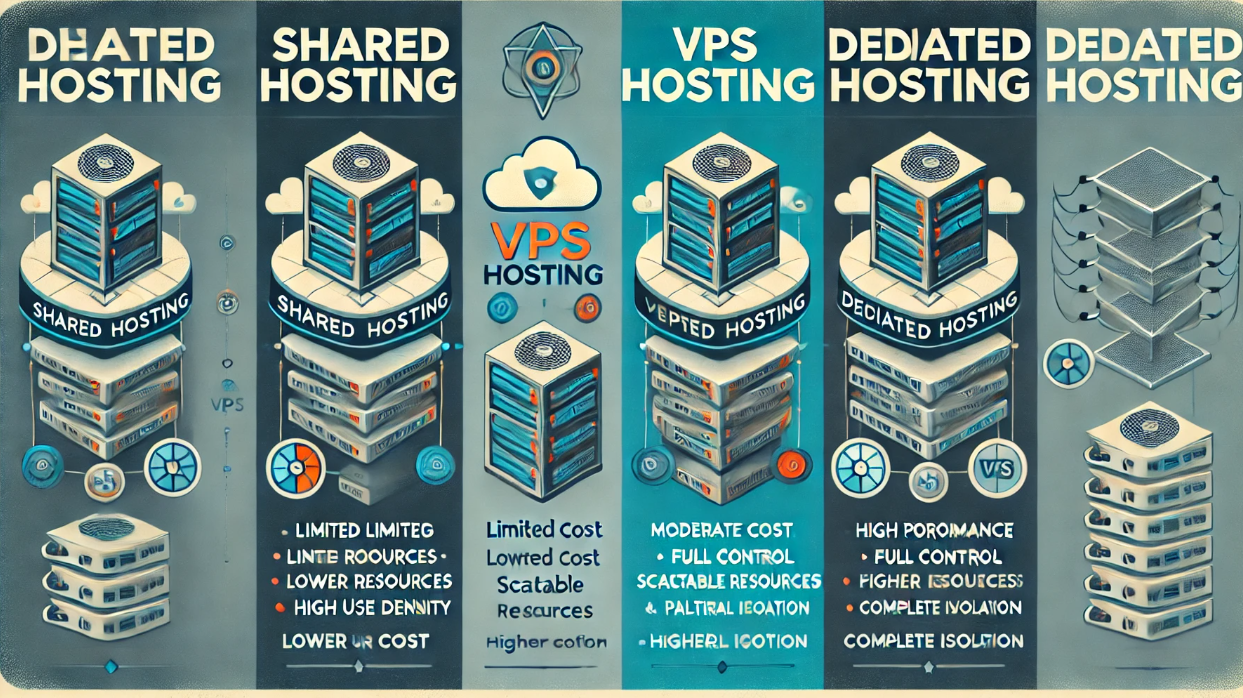How to Choose the Right Hosting Plan for Your Website
Meta Description: Confused about hosting? This beginner-friendly guide compares shared hosting, VPS, and dedicated servers — so you can confidently choose the best plan for your website’s needs and budget.
Introduction: Hosting Shouldn’t Be a Guessing Game
Choosing the right hosting plan can feel overwhelming — especially when you’re just getting started. With so many options (shared, VPS, dedicated), it’s easy to wonder:
-
Will this plan support my website as it grows?
-
Am I overspending?
-
What’s the difference between these options anyway?
Good news: you’re not alone — and this guide will break it all down for you in simple terms, so you can make the best decision for your project, your traffic, and your budget.
The Three Most Common Hosting Types
| Hosting Type | Summary |
|---|---|
| Shared Hosting | Most affordable, beginner-friendly, but limited resources |
| VPS Hosting | Private server space, scalable, flexible, ideal for growing sites |
| Dedicated Hosting | Full physical server, high-performance, for enterprise-level needs |
1. Shared Hosting – The Starter Pack
What It Is:
Shared hosting means your website lives on a server with many other websites — all sharing the same CPU, RAM, and storage.
Best For:
-
New websites
-
Personal blogs
-
Small businesses with low traffic
Pros:
-
Lowest cost (often $3–$10/month)
-
No technical experience needed
-
Easy one-click installers (WordPress, etc.)
Cons:
-
Slower performance
-
Limited customization
-
Affected by other sites on the same server
Verdict: Great for beginners, but you’ll outgrow it quickly as your site or business scales.
⚙️ 2. VPS Hosting – The Flexible Middle Ground
What It Is:
VPS (Virtual Private Server) hosting gives you a dedicated slice of a physical server with your own RAM, CPU, and OS — isolated from other users.
Best For:
-
Growing businesses
-
Developers or agencies
-
Medium-traffic websites and eCommerce stores
Pros:
-
Faster and more reliable than shared hosting
-
Root access and full control
-
Easily scalable as your traffic increases
Cons:
-
Slightly more technical (though many offer managed options)
-
Costs more than shared hosting ($5–$50/month)
⚡ Verdict: The sweet spot for most serious websites. Powerful, private, and affordable.
3. Dedicated Hosting – Full Power, No Sharing
What It Is:
You get an entire physical server to yourself — no sharing, no limitations.
Best For:
-
High-traffic websites
-
Large eCommerce stores or SaaS platforms
-
Enterprises needing full control and compliance
Pros:
-
Maximum performance and reliability
-
Full control over hardware, OS, and software
-
Ideal for custom environments
Cons:
-
High cost ($80–$300+/month)
-
Requires technical knowledge or managed support
Verdict: Enterprise-grade hosting with full freedom — but only worth it if you need the power.
Quick Comparison Table
| Feature | Shared Hosting | VPS Hosting | Dedicated Hosting |
|---|---|---|---|
| Performance | Low | Medium to High | Highest |
| Control | Minimal | Full (root access) | Full (hardware-level) |
| Scalability | Limited | Very Scalable | Hardware-bound |
| Security | Basic | Strong (isolated) | Strongest (isolated) |
| Cost | $3–$10/month | $5–$50/month | $80–$300+/month |
| Best For | Starters, blogs | Growing businesses | High-traffic/enterprise |
How to Choose the Right Hosting for YOU
Ask yourself:
How much traffic do I expect?
-
Low traffic → Shared
-
Growing traffic → VPS
-
Heavy traffic → Dedicated
Do I need to install custom apps or software?
-
Yes → VPS or Dedicated
-
No → Shared might be enough (initially)
Do I care about speed and SEO?
-
VPS and Dedicated both improve Core Web Vitals, which boost search rankings.
What’s my budget?
-
Shared is cheapest short-term
-
VPS offers the best balance of cost vs performance
-
Dedicated is an investment for serious infrastructure
✅ Final Thoughts: Start Smart, Scale Smarter
Choosing a hosting plan isn’t just about what’s cheapest — it’s about what sets your website up for success.
-
Start with shared hosting if you’re launching a new site with minimal traffic.
-
Choose VPS hosting if you’re growing, need more speed, or want full control.
-
Go dedicated if your business runs on mission-critical infrastructure and can’t afford downtime.
And remember — the right provider should make it easy to upgrade as you grow.

